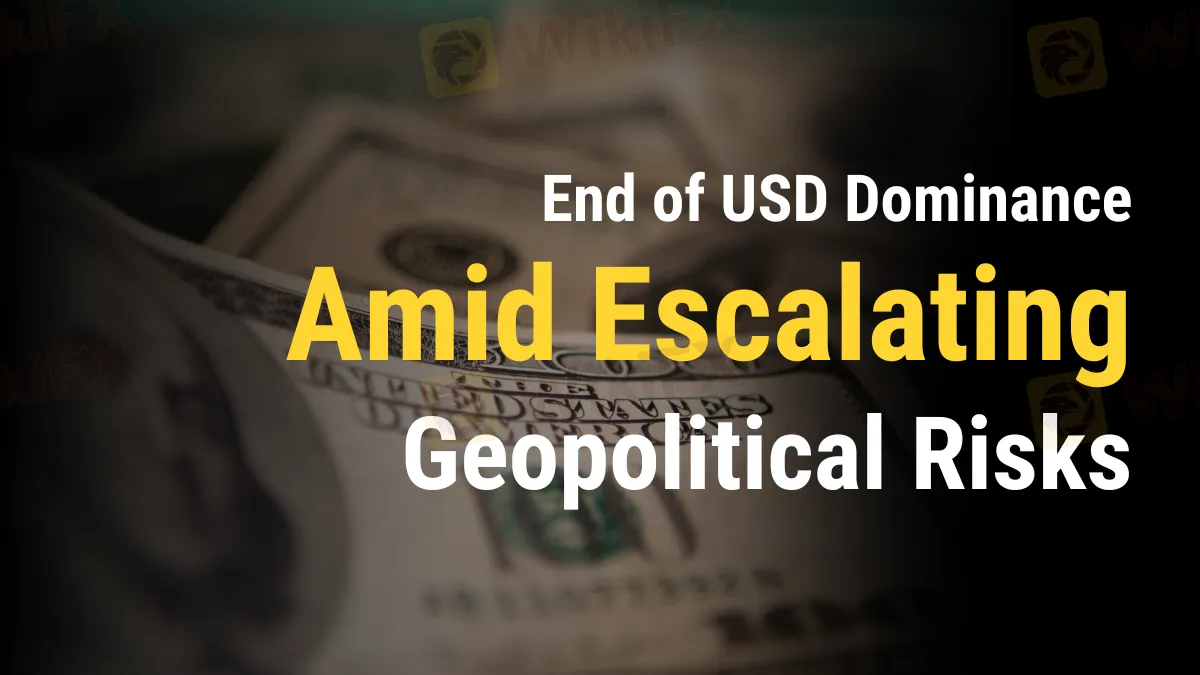简体中文
繁體中文
English
Pусский
日本語
ภาษาไทย
Tiếng Việt
Bahasa Indonesia
Español
हिन्दी
Filippiiniläinen
Français
Deutsch
Português
Türkçe
한국어
العربية
End of USD Dominance Amid Escalating Geopolitical Risks
Abstract:After Israel's retaliation, currency markets face volatility, reflecting geopolitical tensions and influencing global currency forecasts.

After Israel's retaliatory assaults on Iran, currency markets have seen heightened volatility, suggesting a potential shift in the dominant role of the US dollar.
According to recent data from the Philly Fed manufacturing survey, there was an early increase in confidence in the US currency. This aligns with the Federal Reserve's prudent monetary policy approach.
However, concerns arise over the long-term sustainability of this advancement, considering the escalating global conflicts. The 2% increase in crude oil prices highlights the market's susceptibility to geopolitical events, adding complexity to currency forecasts.
Positive and negative economic outcomes were observed in the United States before the geopolitical escalation, with concerns regarding the repercussions of a strong dollar contributing to this balance. The IMF's cautions over divergence, namely regarding significant fiscal deficits in the US relative to other advanced countries, have intensified market examination. Although the dollar demonstrates resilience against specific currencies, market sentiment suggests that this discrepancy may be subject to limitations.

Due to the disparity in interest rates between the European Union and the United States, in addition to cautious statements by ECB officials, currency forecasts have become more complicated. Subsequently, the Japanese yen initially appreciated following the reaction from Israel, indicating a more widespread avoidance of risk. However, upon closer inspection of the data from Japan, a more nuanced picture emerges due to the unexpectedly low Consumer Price Index (CPI) readings, which raise concerns about the potential presence of inflationary behaviors.
The complicated balance in global foreign exchange discussions is evident since Washington expresses no significant worry over the declining value of the yen. The correlation between geopolitical events and currency markets underscores the need for flexible policies and approaches. While an initial aversion to risk may exist, policy measures and broader economic fundamentals will ultimately determine the course of currency fluctuations.
In the current period of instability, investors must possess an all-encompassing understanding of global dynamics to identify potential opportunities amidst uncertainty.

Disclaimer:
The views in this article only represent the author's personal views, and do not constitute investment advice on this platform. This platform does not guarantee the accuracy, completeness and timeliness of the information in the article, and will not be liable for any loss caused by the use of or reliance on the information in the article.
Read more

Cambodia Bans Major Crypto Exchanges Over Crime Concerns
Cambodia blocks access to Binance, Coinbase, and OKX amid a crackdown on illegal crypto activities like money laundering, with mobile apps still operational.

Businessman Pleads Guilty to $5.9M Ponzi Scheme
Sylvein William Maximilian D’Habsburg pleads guilty to defrauding Filipino investors out of $5.9 million, falsely claiming ties to celebrities and European nobility

ADB and Mastercard Support MSMEs with $1B Financing
ADB and Mastercard’s $1B initiative targets MSMEs in the Philippines, focusing on women-led businesses and climate finance to drive inclusive economic growth.

StoneX Financial Secures General Clearing Membership with ECC
StoneX Group Inc. has announced that its subsidiary, StoneX Financial Limited, has been granted General Clearing Member (GCM) status by European Commodity Clearing AG (ECC).
WikiFX Broker
Latest News
Ontario launches major US ad campaign amid Trump's tariff threat
Capital.com Collaborated with Amazon in the UAE
ActivTrades Gains Regulatory License in Mauritius
Ripple’s RLUSD Stablecoin Expected to Launch in NY by Dec. 4
Apple Pay, Google Pay Eyeing Launch in the Philippines
easyMarkets Kicks Off the Start of Its Trade with the Champions Competition
Businessman Pleads Guilty to $5.9M Ponzi Scheme
Philippines Warns Public of Get-Rich-Quick Scams This Christmas
Know Ins & Outs of Prop Trading Firms
Malaysian Loses RM2.6 Million to Online Investment Scam
Currency Calculator


